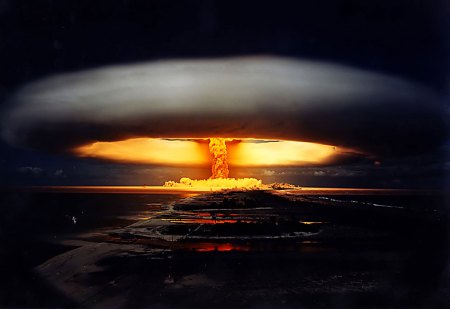Archive for January, 2019
January 27, 2019

The Bulletin of the Atomic Scientists’ Science and Security Board has released its annual metaphorical assessment of the risks faced by life on Earth—the Doomsday Clock—for 2019 as being 11:58pm, or 2 minutes before utter destruction. 🚨 🚨
Citing lack of progress on nuclear risks and climate change dangers as “the new abnormal,” the Doomsday Clock remains at 2 minutes to midnight, as close to the symbolic point of annihilation that the iconic Clock has been since 1953 at the height of the Cold War. […]
“A new abnormal: It is still two minutes to midnight. Humanity now faces two simultaneous existential threats, either of which would be cause for extreme concern and immediate attention. These major threats—nuclear weapons and climate change—were exacerbated this past year by the increased use of information warfare to undermine democracy around the world, amplifying risk from these and other threats and putting the future of civilization in extraordinary danger… The ‘new abnormal’ that we describe, and that the world now inhabits, is unsustainable and extremely dangerous. The world security situation can be improved, if leaders seek change and citizens demand it. It is 2 minutes to midnight, but there is no reason the Doomsday Clock cannot move away from catastrophe. It has done so in the past, because wise leaders acted—under pressure from informed and engaged citizens around the world.”
In January 2017, the Doomsday Clock’s minute hand edged forward by 30 seconds, to two and a half minutes before midnight. For the first time, the Doomsday Clock was influenced by statements from an incoming US President, Donald Trump, regarding the proliferation and the prospect of actually using nuclear weapons, as well as statements made in opposition to US commitments regarding climate change. Last year, the Doomsday Clock moved forward again to two minutes before midnight.
In addition to this dire prognosis, the Bulletin’s authors present some serious suggestions.
#RewindtheDoomsdayClock is a major message of the 2019 Doomsday Clock statement, with the following action steps among those recommended:
- US and Russian leaders should return to the negotiating table to resolve differences over the INF treaty; to extend the nuclear arsenal limits of New START beyond 2021 and to seek further reductions in nuclear arms; to discuss a lowering of the alert status of the nuclear arsenals of both countries; to limit nuclear modernization programs that threaten to create a new nuclear arms race; and to start talks aiming toward elimination of battlefield nuclear weapons.
- The United States and Russia should discuss and adopt measures to prevent peacetime military incidents along the borders of NATO. Provocative military exercises and maneuvers hold the potential for crisis escalation. Both militaries must exercise restraint and professionalism, adhering to all norms developed to avoid conflict and accidental encounters.
- US citizens should demand climate action from their government. Climate change is a serious and worsening threat to humanity. Citizens should insist that their governments acknowledge it and act accordingly. President Trump’s decision to withdraw the United States from the Paris climate change agreement was a dire mistake. The Trump administration should revisit that decision, which runs counter to credible science.
- The temperature goal of the Paris climate agreement—to keep warming below 2 degrees Celsius and, ideally, below 1.5 degrees—is consistent with consensus views on climate science, eminently achievable, and economically viable, if poor countries are given the support they need. But countries have to act promptly and redouble their efforts to reduce greenhouse gas emissions well beyond their initial inadequate pledges to the Paris agreement.
- The Trump administration should revisit its lamentable decision to exit the Joint Comprehensive Plan of Action for limiting Iran’s nuclear program. The Iran agreement is not perfect, but it serves the interest of the international community in restraining the spread of nuclear weapons. […]
Of course, it is doubtful that the U.S. government will do any such thing. Therefore, it is our collective human responsibility to ensure that either they are pressured into doing this (as through the walk-outs/wildcat strikes which arguably ended Trump’s shutdown)—or we do it instead.
Tags:climate breakdown, climate change, Donald Trump, Doomsday Clock, general strike, global warming, INF, Iran, JCPOA, labor, NATO, nuclear war, nuclear weapons, Paris Agreement, Putin, Russia, START, Trump, Trump shutdown, war, warfare, wildcat strike
Posted in 'development', Abya Yala, anarchism, biology, climate catastrophe, displacement, ecology, health, imperialism, Imperiled Life, nuclear, requiems, Revolution, U.S., war | Leave a Comment »
January 13, 2019

Courtesy Joey Ayoub
Many thanks to the anarchist Freedom Press (UK) for republishing my critical analysis of a former comrade platforming Assadist fascist Vanessa Beeley on KPFK! The editors have chosen a new (and fitting) title for it: “Radical Media & the Blurred Lines of ‘Red’ Fascism.”
Javier Sethness looks at the modern rise of “red-brown” politics and its infection of the left through the lens of a recent Indy Media on Air showing with prominent radical media figure Chris Burnett, wh[o] gave Assadist hardliner Vanessa Beeley a platform offering oddly softball questions.
This piece was originally published on the blog of Coalition for Peace, Revolution, and Social Justice (CPRSJ), and was then reposted here.

Kafranbel, Idlib province, September 2018
Tags:Aleppo, Assad, Assad Regime, Bashar al-Assad, chemical weapons, Chris Burnett, conspiracism, CPRSJ, Eastern Aleppo, Eastern Ghouta, fascism, Ghouta, Indy Media, Indymedia on Air, KPFK, red fascism, red-brown alliance, Russia Today, Syria, Syrian Revolution, Vanessa Beeley, Vladimir Putin, war crimes, White Helmets
Posted in 'development', Abya Yala, anarchism, climate catastrophe, displacement, Europe, fascism/antifa, imperialism, Imperiled Life, Palestine, reformism, requiems, Revolution, Russia/Former Soviet Union, Shoah, Syria, U.S., war | Leave a Comment »
January 11, 2019

Courtesy Psychology Today
In November 2018, the American Society of Human Genetics (ASHG) took a public stand against resurgent white-supremacist and neo-fascist ideologies by clearly stating that there is no scientific basis for the purported existence of races among human beings. Race and racial hierarchies are instead social constructs. From the main text:
“The American Society of Human Genetics (ASHG) is alarmed to see a societal resurgence of groups rejecting the value of genetic diversity and using discredited or distorted genetic concepts to bolster bogus claims of white supremacy. ASHG denounces this misuse of genetics to feed racist ideologies. In public dialog, our research community should be clear about genetic knowledge related to ancestry and genomic diversity. To that end, ASHG affirms the following:
- Genetics demonstrates that humans cannot be divided into biologically distinct subcategories. Although there are clear observable correlations between variation in the human genome and how individuals identify by race, the study of human genetics challenges the traditional concept of different races of humans as biologically separate and distinct. This is validated by many decades of research, including recent examples.1,2,3,4,6
- Most human genetic variation is distributed as a gradient, so distinct boundaries between population groups cannot be accurately assigned. There is considerable genetic overlap among members of different populations. Such patterns of genome variation are explained by patterns of migration and mixing of different populations throughout human history.7 In this way, genetics exposes the concept of “racial purity” as scientifically meaningless.
- It follows that there can be no genetics-based support for claiming one group as superior to another. Although a person’s genetics influences their phenotypic characteristics, and self-identified race might be influenced by physical appearance, race itself is a social construct. Any attempt to use genetics to rank populations demonstrates a fundamental misunderstanding of genetics.
ASHG will continue to advance scientific knowledge and debunk genetics-based arguments promoting racial supremacy. ASHG also encourages all society members to be active as citizens in political, policy, and social advocacy organizations that reflect their values. This is a perfect complement to their scientific contributions to this debate through ASHG. […]
Recognizing that the invocation of genetics to promote racist ideologies is one of many factors causing racism to persist, ASHG will focus in the public arena on contributing new fundamental knowledge to the societal dialog about ancestry, supporting greater diversity in research, continuing to engage the field and public to build genetic literacy, and addressing misconceptions of genetics and ancestry.”
Tags:American Society of Human Genetics, ancestry, ASHG, biology, diversity, genetics, human genetics, neo-fascism, phenotype, pseudo-science, racial hierarchy, racialism, racism, white supremacism, white supremacy
Posted in 'development', Abya Yala, biology, Europe, fascism/antifa, health, imperialism, U.S. | Leave a Comment »



